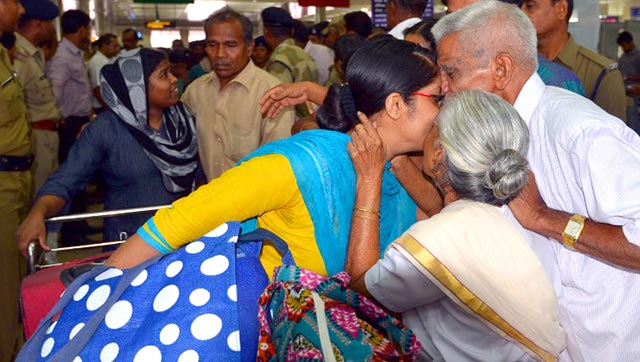Thiruvananthapuram: TV Jose and his wife Jolly haven’t slept properly for the last two weeks. The poor farm hand couple from Kuravilangad in Kerala’s Kottayam district didn’t know whom to turn to when news of the escalating civil war in Yemen trickled in. All their three daughters are nurses, and two of them, Josely (28) and Jaseena (24), have been stuck in Yemen. Two days ago, the two sisters called him to say that the situation there was really bad, further distressing poor Jose.
“My youngest daughter works in our home town and the elder two left for Yemen two years ago hoping to ease our debt burden. In two years, they got salary only thrice,” he says.
Jose had to cough up Rs 2 lakhs for their travel papers. And, since their salaries were not paid on time, he had to take fresh loans.
His two-room house already mortgaged, Jose now has a total debt of Rs 13 lakhs. That’s one reason why his daughters are reluctant to return home empty-handed. “It is not greed that forces us to send our wards abroad. They take up such assignments on their own to ease financial constraints of the family.”
In neighbouring Idukki district, 26-year-old Elizabeth Johnson’s parents spend most of their time in the church these days. Whenever their phone rings they scramble for some good news. Elizabeth went to Yemen in 2013 to work in a hospital in capital Sana’a after paying Rs 1.5 lakhs to a travel agent. “She spent Rs 3 lakhs on her nursing training in Andhra Pradesh. Though she worked in Hyderabad and Delhi for a while, the salary wasn’t enough to pay up the debt,” says her father P Johnson, who works as a daily-wager.
That nurses from Kerala are in high demand in India and abroad is well known. What is often untold is the story of their struggles to make life better back home. Chasing that dream, they often end up on the wrong side, like in Iraq, Libya, and now Yemen, where more than 500 nurses from Kerala are stranded.
It is the poor working conditions and meagre pay in their home state that force them to take up jobs abroad, often in hostile environments. Most Kerala nurses start out by taking educational loans and then cough up hefty fees for their visas to work abroad, where the pay is almost five-fold.
Since developed nations insist on language proficiency tests and other criteria for jobs, many GNM (General Nurse and Midwifery) diploma-holders prefer smaller countries where the rules are flexible. Greedy travel agents and middlemen exploit this weakness and charge them as much as Rs 2 lakhs for a visa, promising good pay.
Every year, Kerala’s 100-odd nursing colleges churn out about 20,000 nurses and several institutes in neighbouring states also enroll students from the state. Hospitals exploit the glut in the market to dole out meagre salaries. “Six years ago I was getting Rs 5,000 a month in Kochi. Later in Jeddah it went up to Rs 25,000 and in Iraq I was drawing Rs 60,000 a month,” explained a returnee from Iraq, who did not want to be named.
The state itself may boast about its most famous export, but it doesn’t have any proper data on the nurses working abroad. “Since they hop from one country to another we don’t have exact figures. Around 3,500 Indians are stranded in Yemen. Out of these 70% are people from Kerala. And among them, the nurses number between 500 and 700,” said state culture minister K C Joseph, who also holds the portfolio dealing with NRI Malayalees.

